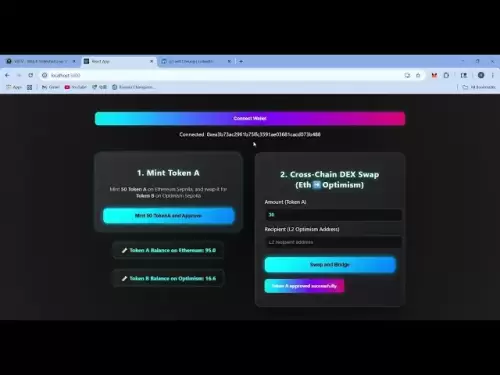 |
|
 |
|
 |
|
 |
|
 |
|
 |
|
 |
|
 |
|
 |
|
 |
|
 |
|
 |
|
 |
|
 |
|
 |
|
Cryptocurrency News Articles
The social media accounts of Kaito AI, an AI-driven platform that collects cryptocurrency data for market analysis, and its founder, Yu Hu, were hacked in an attempt to profit from short positions.
Mar 16, 2025 at 08:13 am
On March 15, unknown hackers compromised the X (formerly Twitter) accounts of crypto platform Kaito AI and its founder, Yu Hu. This incident highlights the growing sophistication of fraud techniques using social engineering and cybersecurity breaches that continue to plague the crypto industry.

The crypto industry continues to be targeted by sophisticated fraud techniques, combining social engineering and cybersecurity breaches. In a recent incident, the social media accounts of Kaito AI, an AI-driven platform that collects cryptocurrency data for market analysis, and its founder, Yu Hu, were hacked in an attempt to profit from short positions.
On March 15, unknown hackers compromised the X (formerly Twitter) accounts of crypto platform Kaito AI and its founder, Yu Hu. This incident follows a series of crypto scams and exploits, highlighting the persisting problem despite efforts to mitigate it.
Classic scams often involve promoting fake tokens or phishing attempts to steal user credentials. However, this latest attack, according to DeFi Warhol, saw hackers open short positions on KAITO tokens. They then used the hacked accounts to post messages claiming Kaito AI's wallets had been compromised and user funds were at risk, intending to induce panic selling. This price drop would allow the attackers to profit from their short positions.
Exploits are becoming more sophisticated
After discovering the fake posts and regaining control of his account by resetting his passwords, Yu Hu reassured the community.
"Good morning everyone! I'm back and my account has been recovered. I woke up to messages about strange posts on my X account. I want to clarify that I never posted anything about needing help transferring funds or being hacked. I fell victim to a phishing scam and the hackers gained access to my account."
The community members quickly notified Hu about the posts, which claimed that Kaito AI's wallets were compromised and users' funds were in danger. The hackers also posted a message from Hu saying that he was "feeling very depressed" and might leave the project.
After discovering the fake posts and regaining control of his account by resetting his passwords, Hu reassured the community.
"After checking with the team, we can confirm that the articles circulating about Kaito being hacked are false and part of a phishing scam to steal from users,' Hu said.
'We will never ask for any private keys or seed phrases. We will never DM anyone first to offer any investment advice or crypto. If you receive any such messages, please ignore them and report the user.'
Meanwhile, on the day of the hack, the KAITO token price fluctuated between $1.56 and $1.34, a difference of over 16%. It appears that some traders fell for the false messages and rushed to sell their tokens, accelerating KAITO's rapid price decline.
Later, Hu wrote that they learned that the hacker had earned about $1 million on a short bet on Hyperliquid.
As we wrote, according to DappRadar's latest report, NFT trading volume has dropped by 63% between December and February—from $1.36 billion to $997 million in January, and further down to $498 million in February. However, some collections remain active.
Disclaimer:info@kdj.com
The information provided is not trading advice. kdj.com does not assume any responsibility for any investments made based on the information provided in this article. Cryptocurrencies are highly volatile and it is highly recommended that you invest with caution after thorough research!
If you believe that the content used on this website infringes your copyright, please contact us immediately (info@kdj.com) and we will delete it promptly.





























































